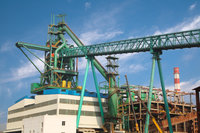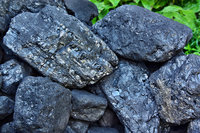T.L. "Terry" Headley has been named communications director for the American Coal Council. Before joining ACC, Terry spent more than eight years as director of communications for the West Virginia Coal Association, and during this time he was also instrumental in expanding the Friends of Coal network and social media presence. His extensive public relations background includes time as a newspaper editor and reporter, and acting as a spokesperson for state government in West Virginia. Terry holds both a master’s degree in public relations/journalism and an MBA. A native of West Virginia, he is a 2001 graduate of Leadership West Virginia and has more than 25 years of experience in mass communications.
Terry joins ACC as the organization approaches its 35th year of service to our members and the coal industry. His strong background and direct work experience in the coal association arena will be leveraged to advance the American Coal Council’s communications, publications, and advocacy programs.
Terry would be pleased to hear from you as he undertakes his new responsibilities. He can be reached by email at theadley@americancouncil.org and by phone at ACC’s Washington, D.C. office at 202.756.4540 or direct at 202.816.0253.
|
The Society for Mining, Metallurgy & Exploration Inc. (SME) has launched a new campaign designed to improve the public perception of the mining industry. Move Mining" is a team competition, and the goal is to develop a positive message campaign to promote mining worldwide. This inaugural competition will be held at the February 2017 SME Annual Conference & Expo in Denver, Colorado. Be creative in promoting a positive image of the importance of mining, highlighting the essential role that it plays in our daily lives, our lifestyles, and our standard of living.
|

 The American Coal Foundation (ACF) provides fact-based materials about coal to teachers and students in grades K-12 in the U.S. ACF has been enhancing its education resources and communications tools, including the rollout of a new website at teachcoal.org. Several new coal education publication and related materials are also available, including a new ACF Digital Library. The American Coal Foundation (ACF) provides fact-based materials about coal to teachers and students in grades K-12 in the U.S. ACF has been enhancing its education resources and communications tools, including the rollout of a new website at teachcoal.org. Several new coal education publication and related materials are also available, including a new ACF Digital Library.
Make sure teachers in your communities are aware of the free materials about coal’s role in our lives with the ACF’s hands-on activities, experiments, lesson plans, and more:
|
By Rob Fisher, Charlie Choe, and Ken DitzelFTI Consulting recently released a white paper on the economic impacts of accelerated nuclear retirements under the Clean Power Plan (CPP). The analysis found that wholesale electricity prices in the Eastern Interconnect would increase by 6 to 8 percent from the start of the CPP in 2022 through 2030 and would increase by 15 percent by 2035. Why are these findings important to coal producers, transporters and terminal operators, power sector coal consumers, and suppliers to the coal value chain?
|
| |
 |
| |
|
By Fred Pace, Huntington Herald-DispatchA recent upturn in the price of metallurgical coal is expected to spark new production and some additional employment in at least one smaller part of the beleaguered Appalachian coal industry. But how long the surge lasts remains to be seen. The spot market price of metallurgical or "met" coal has grown from a low of less than $80 a ton just a few months ago to more than $200 a ton today. "There are several reasons for this, but the primary reason for the recent run up is the decision by China to cut production of metallurgical coal there," said T.L. "Terry" Headley, communications director for the American Coal Council. "The recent rally in price for metallurgical coal is a welcome sign for the coal industry, as is news that financial institutions like Goldman Sachs have revised their projections and suggest that higher met coal prices are likely to remain into the foreseeable future," Headley said. "In fact, Goldman is projecting prices stabilizing in the $135-145 price range over the next couple of years. Of course, there is no certainty in the marketplace, but this combined with recent improvements in the demand for steam coal provide the first real positive moves in the U.S. marketplace in several years."
|
 |
|
| |
|
By Alfred E. Lechner, Jr.The Clean Air Act, signed into law by President Lyndon B. Johnson in 1963, contains a little-known provision that enables individuals who have lost their jobs to ask the EPA to examine whether its regulatory actions were at fault. Upon receiving such requests, the agency must conduct an investigation and potentially hold public hearings. Congress specifically included this requirement to better gauge the impact of EPA regulations on the American job market. Unfortunately, 50 years after the Act's passage, the EPA has still not set up this process, much less given it teeth. As a result, Americans who wish to request an investigation have no idea where to start; this undoubtedly dissuades many from trying. Equally concerning, the agency has failed to establish any rules to guide its actions. This enables the EPA to tilt the few investigations it does undertake in its own favor -- or ignore requests entirely. The EPA should formalize the investigation and hearing process immediately. It has already done so for the Clean Water Act, passed in 1972. There is no reason why it has not done the same for the older -- and more expansive -- Clean Air Act.
|
Could climate policy geared toward curtailing the burning of fossil fuels jeopardize developments that have benefited countless people and communities across the world, threaten a shale revolution that has transformed the energy sector? That's the argument from Kathleen Harnett White of the Texas Public Policy Foundation.
|

Wyoming Governor Matt Mead recently announced the opening of the application process for researchers and potential tenants at the Wyoming Integrated Test Center (ITC). The ITC is being built at Basin Electric Power Cooperatives’ Dry Fork Station near Gillette. Its goal is to advance Carbon Capture, Utilization and Storage (CCUS) technologies.
The Wyoming ITC issued a Request for Proposal (RFP) to identify candidates and select initial users of test bays. Interested parties may obtain and submit applications at www.wyomingitc.org.
The RFP gives interested parties the opportunity to "lease," at no cost, a test bay with flue gas slipstream from a coal-fired power plant in a competitive process. The ITC will provide developers of advanced post-combustion CO2 capture technologies a place to test equipment and processes in a real-world commercial facility.
Individuals and groups in private industry, government agencies, government laboratories, university faculty and staff may submit proposals. Proposals are due to the Wyoming Infrastructure Authority by December 12, 2016. The ITC is expected to be available in late 2017.
For more on the ITC and information on the process, please visit www.wyomingitc.org or contact Jason Begger, Executive Director of the Wyoming Infrastructure Authority, at jason.begger@wyo.gov or 307-635-3573.
|
| |
 |
| |
|
By Abby Harvey, GHG Daily MonitorWith three large-scale projects months from operation in the U.S. and a recent reprioritization in the Department of Energy’s coal office, carbon capture utilization and storage is about to have its moment, David Mohler, deputy assistant secretary for clean coal and carbon management within the DOE Office of Fossil Energy, said Thursday. "I think we’re at a pretty pivotal time," he said during a presentation at the U.S. Energy Association’s Annual Energy Supply Forum. "I think we’re about to turn the corner for CCUS." Declining coal use in the U.S., Mohler said, is not a reason to ignore developing CCS technology for coal generation. "Carbon capture is a domestic and global necessity," he said. "There are voices in this country, and in Washington in particular, that talk about why we don’t we just leave all the fossil fuels in the ground and let’s just do it all with renewables and energy efficiency." Even if the U.S. stopped burning fossil fuels, he added, other nations, particularly developing countries that are prioritizing bringing electricity to their citizens, will not leave their fossil fuels in the ground. "There’s a real challenge here globally, not the least of which, in my opinion, is can the U.S. lead here? Can we develop the technologies that are going to be globally useful and actually take those technologies into the global market with some competitive advantage?" he said.
|
By Dan SpringerThe massive coal-fired plant in Boardman, Oregon, is just four years away from being shut down for good – at that point, Oregon coal production will be no more, after the state became the first in the nation to completely ban coal power. The mandate, signed into law earlier this year, was the result of an environmentalist-fueled push by the Democrat-controlled legislature. Under the plan, coal production will end once the Boardman plant shutters in 2020 – utilities would still be able to buy coal power from out of state for another 10 years, until a 2030 deadline to end coal use entirely. But the phase-out already has groups warning that residents are headed for big rate increases and brownouts.
|
|
| |
|

